
 |
|
Collateral (2004) Cast: Tom Cruise, Jamie Foxx, Jada Pinkett Smith, Mark Ruffalo, Peter Berg, Bruce McGill, Javier Bardem, Barry Shabaka Henley, Irma P. Hall, Angelo Tiffe, Emilio Rivera, Debi Mazar, Bodhi Elfman 2004 – 119 minutes Rated: Reviewed by Dustin Putman, July 26, 2004. 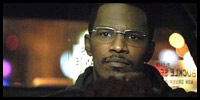 For a summer release, one coming out amidst an onslaught of special effects-laden action and sci-fi films, "Collateral" is a challenging thriller for adults, puppeteered by classy filmmaker Michael Mann (1999's "The Insider") and aided by his know-how of ratcheting suspense and intrigue out of even the most quiet of moments. There are real ideas and themes explored here—the notion that human nature demands people to not pay attention to what doesn't concern them, the realization that one's lifelong dreams for the future are slipping out of their grasp through the cruel passages of both time and inertia—rather than just an excuse to parade out violence and cheap thrills in the name of entertainment. "Collateral" gets all of this just right, but takes a detour in the third act that is disappointingly more conventional than the plot deserves. Ultimately, it concludes being less than the sum of its parts.
For a summer release, one coming out amidst an onslaught of special effects-laden action and sci-fi films, "Collateral" is a challenging thriller for adults, puppeteered by classy filmmaker Michael Mann (1999's "The Insider") and aided by his know-how of ratcheting suspense and intrigue out of even the most quiet of moments. There are real ideas and themes explored here—the notion that human nature demands people to not pay attention to what doesn't concern them, the realization that one's lifelong dreams for the future are slipping out of their grasp through the cruel passages of both time and inertia—rather than just an excuse to parade out violence and cheap thrills in the name of entertainment. "Collateral" gets all of this just right, but takes a detour in the third act that is disappointingly more conventional than the plot deserves. Ultimately, it concludes being less than the sum of its parts.
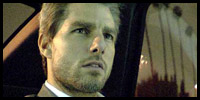 On a seemingly ordinary evening in Los Angeles, mild-mannered cab driver Max (Jamie Foxx) gets a shot at fate when he picks up Annie (Jada Pinkett Smith), a beautiful and intelligent lawyer on her way to clock in some late-night hours as she prepares for an upcoming case. They strike up a conversation, impersonal at first but more playful as they get acquainted with each other, culminating with Annie offering him her business card as a sly come-on. Almost immediately afterward, the sharply-dressed, gray-haired Vincent (Tom Cruise) steps into Max's cab, presenting him $700 if he will chauffeur him around the town as he makes a few pit-stops. It is an offer Max can't refuse, and a mistake that soon has him a veritable prisoner at the hands of Vincent, a contract killer with five specific targets to do away with before the night is over.
On a seemingly ordinary evening in Los Angeles, mild-mannered cab driver Max (Jamie Foxx) gets a shot at fate when he picks up Annie (Jada Pinkett Smith), a beautiful and intelligent lawyer on her way to clock in some late-night hours as she prepares for an upcoming case. They strike up a conversation, impersonal at first but more playful as they get acquainted with each other, culminating with Annie offering him her business card as a sly come-on. Almost immediately afterward, the sharply-dressed, gray-haired Vincent (Tom Cruise) steps into Max's cab, presenting him $700 if he will chauffeur him around the town as he makes a few pit-stops. It is an offer Max can't refuse, and a mistake that soon has him a veritable prisoner at the hands of Vincent, a contract killer with five specific targets to do away with before the night is over.
 "Collateral" is an arrestingly written (by Stuart Beattie) and acted dramatic thriller that refuses to cut easy corners for the majority of its running time. Because it is set over a single night, director Michael Mann is all the more exacting in the way he follows these two men brought together by chance—Max and Vincent—from start to finish of their unlikely relationship. The plot is nothing particularly groundbreaking, and there is a certain sinking predictability in how things are going to turn out, but it is in Mann's slick, sharp-eyed work that enhances the narrative. This is not a film that is all surface; it is quickly apparent that there are extra layers to the characters than first meets the eye and Mann has deeper human topics to explore. He does this startlingly well for most of the running time, avoiding the obvious and keeping the tone subtle and low-key.
"Collateral" is an arrestingly written (by Stuart Beattie) and acted dramatic thriller that refuses to cut easy corners for the majority of its running time. Because it is set over a single night, director Michael Mann is all the more exacting in the way he follows these two men brought together by chance—Max and Vincent—from start to finish of their unlikely relationship. The plot is nothing particularly groundbreaking, and there is a certain sinking predictability in how things are going to turn out, but it is in Mann's slick, sharp-eyed work that enhances the narrative. This is not a film that is all surface; it is quickly apparent that there are extra layers to the characters than first meets the eye and Mann has deeper human topics to explore. He does this startlingly well for most of the running time, avoiding the obvious and keeping the tone subtle and low-key.
Nevertheless, the machinations of the plot occasionally show their seams. As killer Vincent goes from one hit to the next and Max gets further in over his head, practically every event that occurs can be foretold by viewers astute on genre customs. Of course there will be a run-in with the law, as Max must play it cool or risk having Vincent commit the murders of innocent people. And there will be the scene where, for reasons left to be discovered, Max will be forced to pose as Vincent during one of his meetings. And then there are Max's attempts to escape, each one consistently thwarted in the process.  To relieve the decided repetition, screenwriter Stuart Beattie concocts a number of less apparent, more truthful circumstances that transcend the formula. A stop at a hospital to visit Max's feisty mother (Irma P. Hall) is uncharacteristically kind-hearted and tense at the same time, as the viewer is never sure what Vincent might be capable of if Max doesn't do as he is told. The extended opening cab scene between Max and Annie is so expertly conceived, natural, and charming that it could stand as a short film all on its own. Likewise, some of the conversations between Max and Vincent dig beneath the exterior of their personalities, uncovering effective truths about both of them. And, finally, this is one big Hollywood production where none of the characters seem to be safe, no matter how high up the well-known actors appear on the credits list.
To relieve the decided repetition, screenwriter Stuart Beattie concocts a number of less apparent, more truthful circumstances that transcend the formula. A stop at a hospital to visit Max's feisty mother (Irma P. Hall) is uncharacteristically kind-hearted and tense at the same time, as the viewer is never sure what Vincent might be capable of if Max doesn't do as he is told. The extended opening cab scene between Max and Annie is so expertly conceived, natural, and charming that it could stand as a short film all on its own. Likewise, some of the conversations between Max and Vincent dig beneath the exterior of their personalities, uncovering effective truths about both of them. And, finally, this is one big Hollywood production where none of the characters seem to be safe, no matter how high up the well-known actors appear on the credits list.
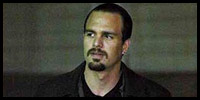 In recent years, Tom Cruise has branched out from playing things safe and heroic, a usual pitfall of big stars, to develop quite a diverse resume (1999's "Magnolia," 2001's "Vanilla Sky," 2003's "The Last Sumurai"). His work as Vincent, an unapologetic murderer who sees his crimes as just another job, is intense and believable. There are no sentimental asides to Cruise's role to please his fans; Vincent is who he is (a wayward, hopeless lost soul), and Cruise straightforwardly plays it that way. On first glance, the comedically-oriented Jamie Foxx (2004's "Breakin' All the Rules") would appear to be an odd choice to play opposite Cruise. It takes all of two minutes to dispel any doubts. As Max, a cab driver who has found himself stuck in a job he sees no future in but can't get motivated to break free from, Foxx gives a superbly understated three-dimensional performance.
In recent years, Tom Cruise has branched out from playing things safe and heroic, a usual pitfall of big stars, to develop quite a diverse resume (1999's "Magnolia," 2001's "Vanilla Sky," 2003's "The Last Sumurai"). His work as Vincent, an unapologetic murderer who sees his crimes as just another job, is intense and believable. There are no sentimental asides to Cruise's role to please his fans; Vincent is who he is (a wayward, hopeless lost soul), and Cruise straightforwardly plays it that way. On first glance, the comedically-oriented Jamie Foxx (2004's "Breakin' All the Rules") would appear to be an odd choice to play opposite Cruise. It takes all of two minutes to dispel any doubts. As Max, a cab driver who has found himself stuck in a job he sees no future in but can't get motivated to break free from, Foxx gives a superbly understated three-dimensional performance.
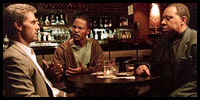 Despite only getting minimal screen time (solely the first and last ten minutes), Jada Pinkett Smith (2003's "The Matrix Reloaded") is dynamite as Annie, making such a deep impression at the beginning that she remains on the viewer's mind throughout the course of the story. Pinkett Smith has never been more charismatic than she is here. The other supporting players are peripheral to the main story, with Mark Ruffalo (2004's "13 Going on 30"), Peter Berg (2001's "Corky Romano"), and Bruce McGill (2003's "Matchstick Men") as investigators hot on Vincent's trail. Because this subplot goes nowhere, and ends up making zero impact on anything else that occurs, it could have been completely excised, saving twenty minutes of screen time with no damage to the finished product.
Despite only getting minimal screen time (solely the first and last ten minutes), Jada Pinkett Smith (2003's "The Matrix Reloaded") is dynamite as Annie, making such a deep impression at the beginning that she remains on the viewer's mind throughout the course of the story. Pinkett Smith has never been more charismatic than she is here. The other supporting players are peripheral to the main story, with Mark Ruffalo (2004's "13 Going on 30"), Peter Berg (2001's "Corky Romano"), and Bruce McGill (2003's "Matchstick Men") as investigators hot on Vincent's trail. Because this subplot goes nowhere, and ends up making zero impact on anything else that occurs, it could have been completely excised, saving twenty minutes of screen time with no damage to the finished product.
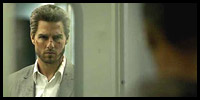 The slam-bang climax, in which Max makes a desperate attempt to save the life of Vincent's last target, is simultaneously flawless and a major letdown. From the point of view of a commercially-based thriller, it is masterful and genuinely nail-biting, certain to have you inching toward the end of your seat. Director Mann, editors Jim Miller (2002's "Serving Sara") and Paul Rubell (2003's "Peter Pan"), and cinematographers Dion Beebe (2003's "In the Cut") and Paul Cameron (2004's "Man on Fire") have a field day with tightly moving back and forth between three different characters and their actions, playing with actual darkness (rather than the usual movie's version of it, with lights conveniently placed upon the subjects), and building a wave of tension in its wake. At the same time, the third-act plot developments fail to do justice to the weighty topics that have come before, targeting familiar thriller-movie conventions when something more had been deserved. The final minutes end especially predictably, even if they do capture one's emotions from a visceral standpoint.
The slam-bang climax, in which Max makes a desperate attempt to save the life of Vincent's last target, is simultaneously flawless and a major letdown. From the point of view of a commercially-based thriller, it is masterful and genuinely nail-biting, certain to have you inching toward the end of your seat. Director Mann, editors Jim Miller (2002's "Serving Sara") and Paul Rubell (2003's "Peter Pan"), and cinematographers Dion Beebe (2003's "In the Cut") and Paul Cameron (2004's "Man on Fire") have a field day with tightly moving back and forth between three different characters and their actions, playing with actual darkness (rather than the usual movie's version of it, with lights conveniently placed upon the subjects), and building a wave of tension in its wake. At the same time, the third-act plot developments fail to do justice to the weighty topics that have come before, targeting familiar thriller-movie conventions when something more had been deserved. The final minutes end especially predictably, even if they do capture one's emotions from a visceral standpoint.
 When all is said and done, "Collateral" remains an enthralling experience, thanks to Mann's smart treatment of the material and the performers' notably strong turns. The ending, however, could have used another rewrite. For a motion picture that demands close audience attention and contemplation for its first 100 minutes, the last 20 unfortunately relegate toward the most commonplace of queries: who lives and who dies. You care about the outcome, even as you acknowledge the film could have been so much more.
When all is said and done, "Collateral" remains an enthralling experience, thanks to Mann's smart treatment of the material and the performers' notably strong turns. The ending, however, could have used another rewrite. For a motion picture that demands close audience attention and contemplation for its first 100 minutes, the last 20 unfortunately relegate toward the most commonplace of queries: who lives and who dies. You care about the outcome, even as you acknowledge the film could have been so much more.
|
© 2004 by Dustin Putman |














